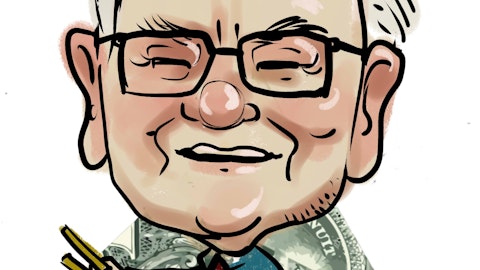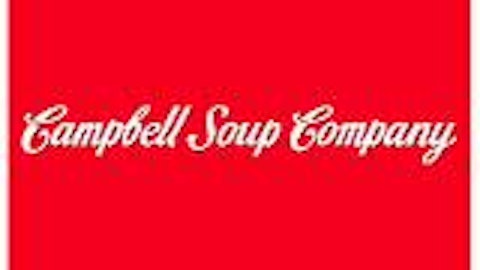McCormick & Company, Incorporated (NYSE:MKC) beat analysts’ expectations today for its bottom line after posting second quarter 2015 earnings of $84.3 million, or $0.65 per share, on revenues of $1.02 billion. Net income adjusted to exclude special charges for the quarter which ended May 31 was reported to be $97.2 million or $0.75 per share. Analysts were expecting a bottom line of $0.68 from a top line of $1.04 billion. In the same quarter a year ago, the spices company reported earnings of $84.5 million, or $0.64 per share, on revenues of $1.03 billion. As with many U.S companies doing foreign business, its sales were negatively impacted by the strengthening U.S dollar compared to a year ago, with sales rising by 5% on a constant currency basis. Furthermore, McCormick & Company also revised its guidance for the full fiscal year, raising its earnings per share outlook to $3.18 to $3.25. This is a $0.03 increase due to a tax rate reduction for the year, the company said. Excluding $0.29 in special charges, adjusted EPS outlook is now $3.47 to $3.54, which the company is confident of achieving the upper end of thanks to some of its recent acquisitions like Stubb’s. Consensus is for an EPS of $3.50 for the full fiscal year, according to data from Thomson Reuters. Wall Street has not reacted kindly to the earnings results, with McCormick opening the day’s session down by 3.41%.

While the company has seen a rise in demand for seasoning over the last couple of years, it has also gathered interest from more hedge funds by the end of the first quarter. The company was in 17 hedge funds’ portfolios at the end of March, two more or 13% than the 15 hedge funds in our database with McCormick holdings at the end of the previous quarter. The total value of their holdings, however, decreased 11.09% to $88.29 million by the end of the first quarter of 2015, a notable drop given the stock climbed 3.78% in the first quarter. So the smart money was collectively giving off a somewhat bearish vibe heading towards this earnings report.
First, a quick word on why we track hedge fund activity. In 2014, equity hedge funds returned just 1.4%. In 2013, that figure was 11.3%, and in 2012, they returned just 4.8%. These are embarrassingly low figures compared to the S&P 500 ETF (SPY)’s 13.5% gain in 2014, 32.3% gain in 2013, and 16% gain in 2012. Does this mean that hedge fund managers are dumber than a bucket of rocks when it comes to picking stocks? The answer is definitely no. Our small-cap hedge fund strategy – which identifies the best small-cap stock picks of the best hedge fund managers – returned 28.2% in 2014, 53.2% in 2013, and 33.3% in 2012, outperforming the market each year (it’s outperforming it so far in 2015 too). What’s the reason for this discrepancy, you may ask? The reason is simple: size. Hedge funds have gotten so large, they have to allocate the majority of their money into large-cap liquid stocks that are more efficiently priced. They are like mutual funds now. Consider Ray Dalio’s Bridgewater Associates, the largest in the industry with about $165 billion in AUM. It can’t allocate too much money into a small-cap stock as merely obtaining 2% exposure would really move the price. In fact, Dalio can’t even obtain 2% exposure to many small-cap stocks, even if he essentially owned the entire company, as they’re simply too small (or rather, his fund is too big). This is where we come in. Our research has shown that it is actually hedge funds’ small-cap picks that are their best performing ones and we have consistently identified the best picks of the best managers, returning 145% since the launch of our small-cap strategy compared to less than 60% for the S&P 500 (see the details).
Follow Ray Dalio's Bridgewater Associates
Insider Monkey also tracks insider sentiment on companies like McCormick & Company, Incorporated (NYSE:MKC). This is to further judge whether company executives are bullish or bearish about their own firm’s stock. However, the company had no insider purchases or sales of shares recorded in the first half of 2015.
Keeping this in mind, we’re going to review the recent action surrounding McCormick & Company, Incorporated (NYSE:MKC).
What does the smart money think about McCormick & Company, Incorporated (NYSE:MKC)?
Of the funds tracked by Insider Monkey, AQR Capital Management, managed by Cliff Asness, holds the biggest position in McCormick & Company, Incorporated (NYSE:MKC). AQR Capital Management has a $24 million position in the stock, comprising 0.1% of its 13F portfolio. Sitting at the number two spot is Renaissance Technologies, managed by Jim Simons, which held a $20.5 million position; less than 0.1%% of its 13F portfolio is allocated to the stock. Other hedgies that hold long positions encompass David Harding’s Winton Capital Management, Israel Englander’s Millennium Management, and David E. Shaw’s D.E. Shaw & Co., L.P.
Now, key hedge funds were leading the bulls’ herd. Arrowstreet Capital, managed by Peter Rathjens, Bruce Clarke and John Campbell, initiated the largest position in McCormick & Company, Incorporated (NYSE:MKC) during the first quarter. Arrowstreet Capital had $2.5 million invested in the company at the end of the first quarter. Glenn Russell Dubin’s Highbridge Capital Management also made a $1.1 million investment in the stock during the quarter. The other funds with brand new McCormick positions are Matthew Hulsizer’s PEAK6 Capital Management, John Burbank’s Passport Capital, and Ken Griffin’s Citadel Investment Group.
The profit beat and optimistic outlook of the company coupled with more smart money managers investing in the stock appears to make McCormick & Company, Incorporated (NYSE:MKC) a good stock to buy at the moment, with the market reacting negatively to the dip in the consumer sales.
Disclosure: None





